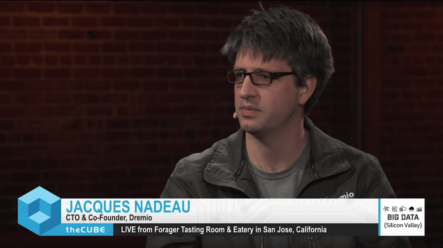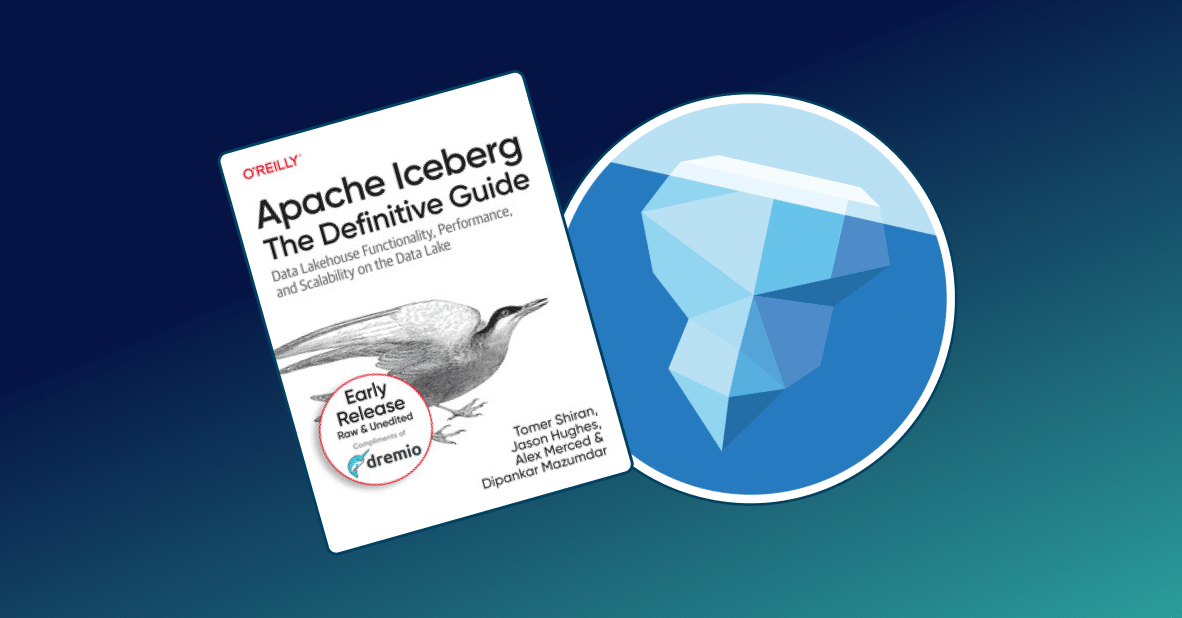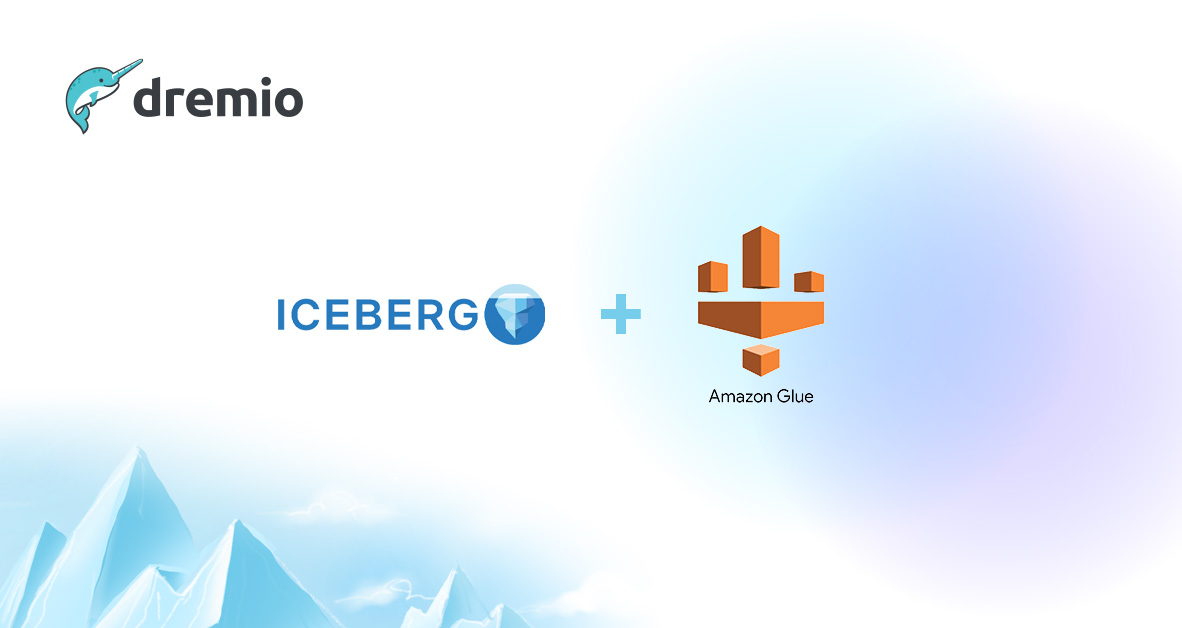15 minute read · March 12, 2018
Jacques Nadeau Discusses Dremio and Big Data with the Cube
· Co-founder and CTO, Dremio

Webinar Transcript
Dave Valente:Jacques Nadeau is here. He is the CTO and co-founder of Dremio. Jacques, welcome to the Cube. Thanks for coming on. Jacques Nadeau:Thanks for having me here. Dave Valente:We were talking a little bit about what you guys do. A three year old company … Well, let me start. Why did you co-found Dremio? Jacques Nadeau:It was a very simple thing I saw. Over the last ten years or so, we saw a regression in the ability for people to get at data. You see all these really cool technologies that came up to store data: data lakes, SQL Systems, all these different things that make developers very agile with data.
But, what we were also seeing was a regression in the ability for analysts and data consumers to get at that data, because the systems weren’t designed for analysts. They were designed for data producers and developers. We said, “You know what? There needs to be a way to solve this. We need to be able to empower people to be self-sufficient again at the data consumption layer.” Dave Valente:Okay. You solved that problem, how? You called it, “The self-service of the data platform.” Jacques Nadeau:Yeah, yeah. Self-service data platform, and the idea is pretty simple. It’s that no matter where the data is physically, people should be able to interact with a logical view of it. We talk a little bit like it’s Google Docs for your data. People can go into the system. They can see the different data sets that are available to them, collaborate around those, create changes to those that they can then share with other people in the organization; always dealing with the logical layer. Then, behind the scenes, we have physical capabilities to interact with all the different systems we interact with; but that’s something that a business user shouldn’t have to think as much about.If you think about how people interact with data today, it’s very much about copies. Every time you want to do something, typically you’re going to make a copy. I want to reshape the data. I make a copy. I want to make it go faster. I make a copy. Those copies are very, very different for people to manage, and they kind of mix the business meaning of data with the physical, “I am making copies to make them faster,” or whatever.
Our perspective is that if you can separate away the physical concerns from the logical, then the business users have much more likelihood to be able to do something self-service. Dave Valente:You’re essentially virtualizing my corpus of data independent of location? Is that right? Jacques Nadeau:It’s part of what we do. Yeah. That’s part of what we do.
The way we look at it is there’s kind of several different components to try to make something self-service. Dave Valente:Yeah. Jacques Nadeau:It starts with, yeah, virtualize or abstract away the details of the physical; but then, on top of that, expose a very user friendly interface that allows people to sort of catalog and understand the different things, search for things that they want to interact with, and then curate things, even if they’re non-technical users.The goal is that if you talk to even large internet companies in the valley, it’s very hard to even hire the amount of data engineering that you need to satisfy all the requests of your N users of data, and so the goal of Dremio is basically to figure out different tools that can provide a non-technical experience for getting at the data. That’s the start of it, but then the second step is, once you’ve got access to this thing and people can collaborate and deal with the data, then you’ve got these huge volumes of data. It’s big data, and so how do you make that go faster. Then we have some components that we deal with speed and acceleration. Dave Valente:Maybe talk about how people are leveraging this capability, this platform, what the business impact is. What have you seen there? Jacques Nadeau:A lot of people have this problem, which is they have data all over the place, and they’re trying to figure out, “How do I expose this to my end users.” Those end users might be analysts. They might be data scientists. They might be product managers that are trying to figure out how their product is working.
What they’re doing today, is they’re typically trying to build system internally to provide these capabilities. For example, working with a large auto manufacturer, and they’ve got a big initiative where they’re trying to make the data that they have … They have huge amounts of data, across all sorts of different parts of the organization, and they’re trying to make that available to different data consumers. Now, of course, there’s a bunch of security concerns that you need to have around that, but they just want to make the data more accessible. What they’re doing is they’re using Dremio to figure out ways to basically catalog all the data below, expose that to the different users, planting lots of different security rules around that, and then create a bunch of reflections, which make the things go faster as people are interacting with things. Dave Valente:Well, what about the governance factor? I mean, you heard this in the Hadoop world years ago. “We’re going to make … We’re going to harden … ” Really, there was no governance. It became more and more important. How do you guys handle that? Do you partner with people? Is it up to the customer to figure that out? Do you provide that? Jacques Nadeau:This is several different things. It’s a complex ecosystem. It’s a combination of things. You start with partnering with different systems to make sure that you integrate well with those things, so there are different things that control some parts of credentials inside the systems, all the way down to, “What’s the file system permissions?” What are the permissions inside of something like Hive and the metastore there, and then other systems on top of that, like Sentry, or Ranger, who are also exposing different credentialing. We work hard to sort of integrate with all those things.On top of that, Dremio also provides a full security model inside of the sort of virtual space that we work, and so people can control the permissions, the ability to access or edit any object inside of Dremio based on user roles and LDAP and those kinds of things. It’s kind of multiple layers that have to be working together. Dave Valente:Tell me more about the company: founded three years ago. You did, I think, a couple of raises.
Jacques Nadeau: Yep. Dave Valente:Who’s backing you? Jacques Nadeau:We founded just under three years ago. We had great initial investors in Redpoint and Lightspeed; so two great initial investors and we raised over 15 million on that round. Then we actually just closed a B round in January of this year, and we added Norwest to the portfolio there. Dave Valente:Awesome, so you’re now in the mode of, They always say, “Software’s such a capital efficient business.” But you see software companies raising $900 million, so, presumably, that’s to compete. You go to market, and differentiate with your messaging and branding. Is that, sort of, what the phase that you’re in now? You kind of developed the product. It’s technically sound. It’s proven in the market space, and now you’re scaling to go to market? Is that right? Jacques Nadeau:That’s exactly right. We’ve had a lot of early successes. A lot of Fortune 100 companies using Dremio today. For example, we’re working with TransUnion and we’re working with Intel. We actually have a great relationship with OVH, which is the third largest hosting company in the world, so a lot of great … Daimler is another one, so working with a lot of great companies, seeing great early success with the product with those companies, and really looking to say, “Hey, we’re out here.” We’ve got a booth for the first time at Strata here and letting people know about a better way or an easier way for people to deal with data, a happier way.
Dave Valente: I mean, it’s a crowded space, right? There’s a lot of tools out there, a lot of companies. I’m interested in how you differentiate. Obviously, simplification is a part of that, the breadth of your capabilities; but maybe in your words you could share with me how you differentiate from the competition and how you break out from the noise? Jacques Nadeau:Yeah, yeah. You’re absolutely right. It’s a very crowded space. Everybody’s using the same words, and that makes it very hard for people to understand what’s going on.
What we found is very simple is that typically we will actually, the first meeting we deal with the customer, within the first ten minutes we’ll demo the product. Because so many technologies are technologies, they’re not products, and so you have to figure out how to use the product. You got to figure out how you would customize it for your certain use case. Dave Valente:Right. Jacques Nadeau:And what we found with our product is by making it very, very simple, people start … The light goes on in a very short amount of time, and so we also do things on our website so that you can see in a couple of minutes, or even less than that, little animations that sort of give you a sense of what it’s about. But, really, it’s just, “Hey, this is a product, which is about … ” There’s this light bulb that goes on. It’s great.You figure this out over the course of working with different customers. There’s this light bulb that goes on. There will be people who are like so confused by all the things that are going on, and if we can just sit down with them, show them the product for a few minutes, all of a sudden they’re like, “Wait a minute. I can use this.”You’re frequently talking to buyers that are not the most technical parts of the organization initially, and so most of the technologies they look at are technologies that are very different to understand, and they have to look to others to try to even understand how it would fit into their architecture. With Dremio, we have customers that have installed, gotten up with it in an hour or two, started to see real value, and that excitement happens even in the demo, with most people. Dave Valente:You kind of have this bifurcated market. Since the big data, I mean, everybody says they’re data driven, and you get a bifurcated market, and then you got the companies that are data driven, and you got companies that say they’re data driven who really aren’t. Who are your customers? Are they in both? Are they predominantly in the data driven side? Are they predominantly in the trying to be data driven? Jacques Nadeau:Well, I would say that they all would say that they’re data driven. Dave Valente:Yeah. Who’s going to say, “Well, we’re not data driven. We’re dead.” Jacques Nadeau:Yeah, yeah, yeah. I would say that everybody has data, and they’ve got some ways that they’re using it well, and other places where they feel like they’re not using it as well as they should. The reason that we exist is to make it so that it’s easier for people to get value of data, and so if they were getting all the value they think they could get out of data, then we probably wouldn’t exist, and they would be fully data driven. I think that everybody is a journey, and people are responding well to us, in part because we’re helping them down that journey. Dave Valente:Well, the reason I ask that question is that we go to a lot of shows and everybody likes to throw out the digital transformation buzzword, and then user … Uber and Airbnb, as an example. But if you dig deeper, you see that data is at the core of those companies, and they’re now beginning to apply machine intelligence, and they’re leveraging all this data that they’ve built up, this data architecture that they built up over the last five or ten years.Then, you’ve got this set of companies where all the data lives in silos, and I can see you guys being able to help them. At the same time, I can see you helping the disruptors. How do you see that, I mean, in terms of your role, in terms of affecting either digital transformations or digital disruptions? Jacques Nadeau:Well, I’d say that in either case … I mean, so we believe sort of simple thing, which is that … Going back to what I said in the beginning, which is that I see this regression in terms of data access. Dave Valente:Yeah. Jacques Nadeau:What happens is that if you have a tightly coupled system between two layers, then it becomes very different for people to accommodate two different sets of needs. The change over the last ten years was the rise of the developer as the primary person for controlling data. That brought a huge amount of great things to it, but analysis was not one of them, and there’s tools that try to make that better, but that’s really the problem.Our belief is very simple, which is that a new tier needs to be introduced between the consumers and the producers of data, and so that tier may interact with different systems, it maybe more complex, or whatever, for certain organizations, but the tier is necessary in all organizations, because the analyst shouldn’t be shaken around every time the developers change how they’re doing data. Dave Valente:Great. John Farrier has a saying that, “Data is the new development kit.” He said that, I don’t know, eight years ago, and it’s really kind of turned out to be the case. Jacques Nadeau, thanks very much for coming on the theCube. Really appreciate your time. Jacques Nadeau:Yeah. Dave Valente:Great to meet you. Good luck, and keep us informed, please. Jacques Nadeau:Yes. Thanks so much for your time. I’ve enjoyed it.
Try Dremio’s Interactive Demo
Explore this interactive demo and see how Dremio's Intelligent Lakehouse enables Agentic AI


